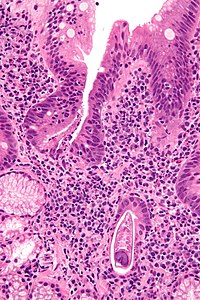
Photo from wikipedia
Rationale: Strongyloidiasis is a parasitic disease caused by Strongyloides stercoralis. The clinical presentation varies according to the stage of infection. Diagnosing strongyloidiasis is a challenge in clinical practice due to… Click to show full abstract
Rationale: Strongyloidiasis is a parasitic disease caused by Strongyloides stercoralis. The clinical presentation varies according to the stage of infection. Diagnosing strongyloidiasis is a challenge in clinical practice due to the inconsistency of eosinophilia and the low sensitivity of standard microscopic stool examination. Strongyloides infection presenting with shock is rare. Patient concerns: In this case, the condition of a 77-year-old immunocompromised patient with intermittent diarrhea progressed to shock and hypoalbuminemia. Reviewing her medical records, we learned that she had experienced intermittent peripheral eosinophilia during the past 10 months. Although a series of examinations were done, the disease progressed and the diagnosis remained uncertain. Diagnosis: Using standard microscopic stool examination and gastroduodenscopy with biopsy, a diagnosis of strongyloidiasis was made. Interventions: After the diagnosis of strongyloidiasis was made, 2 courses of ivermectin were administered. Outcomes: The patient recovered uneventfully after treatment and there is no recurrence of eosinophilia in 1 year follow-up. Lessons: This report provides a brief review of the current modalities used for diagnosing strongyloidiasis. It emphasizes the low sensitivity of microscopic examination, and highlights the role of gastroduodenoscopy in the diagnosis of strongyloidiasis. This report also assures that patients with strongyloidiasis have a good prognosis when they are treated timely and appropriately.
Journal Title: Medicine
Year Published: 2022
Link to full text (if available)
Share on Social Media: Sign Up to like & get
recommendations!